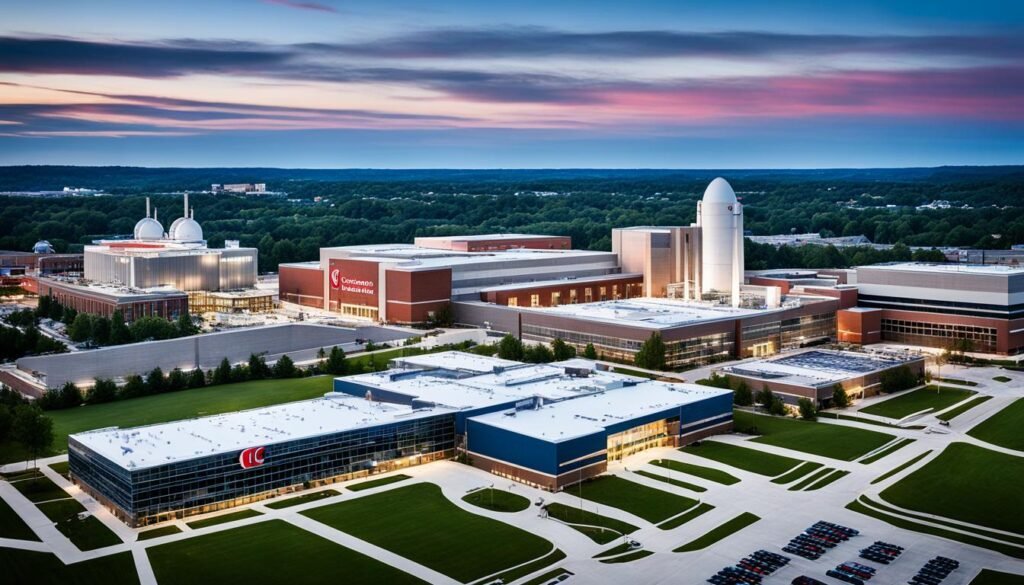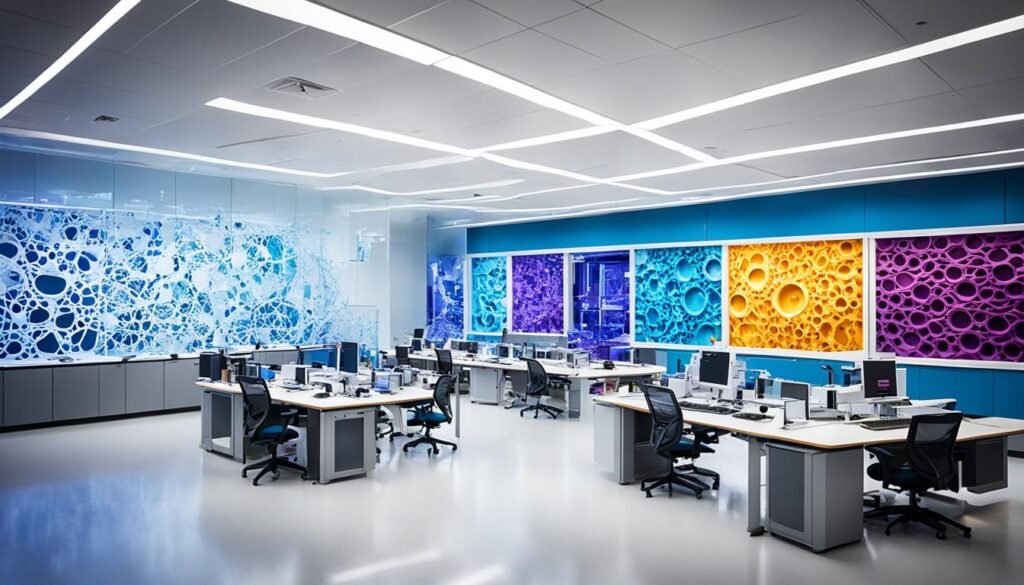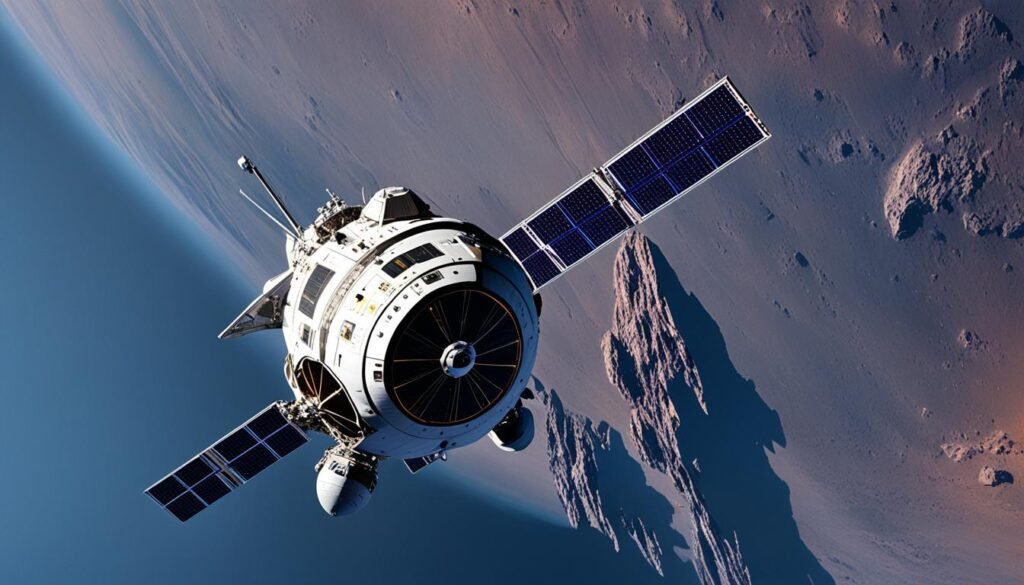The field of space exploration is filled with endless possibilities and numerous research institutes that are at the forefront of cosmic discovery. These institutions play a pivotal role in shaping the future of space missions, advancing technology, and expanding our understanding of the vast universe. From scientific research facilities in aerospace to premier space technology institutes, these organizations are at the cutting edge of space exploration.
In this article, we will explore some of the top research institutes in space exploration. These leading space science institutions are dedicated to pushing the boundaries of knowledge and driving advancements in the field. By delving into their significant contributions and groundbreaking research, we’ll gain a deeper appreciation for the vital role they play in unlocking the mysteries of the cosmos.
Key Takeaways:
- Research institutes in space exploration are instrumental in shaping the future of space missions and technology.
- Leading space research centers contribute significantly to expanding our understanding of the universe.
- Scientific research facilities in aerospace drive advancements in space exploration.
- These premier space technology institutes are at the cutting edge of cosmic discovery.
- Space research organizations play a vital role in deepening our knowledge of the vast universe.
NASA Internship Programs
NASA offers a range of internship programs that provide students with valuable opportunities to contribute to the agency’s mission. These programs, such as the Pathways program, offer hands-on experiences and mentorship from NASA professionals. They are available to students in various disciplines, including non-STEM majors. Interns have the chance to work on impactful projects and gain practical skills while working either remotely or on-site at NASA’s field centers.
By participating in NASA’s internship programs, students can engage with STEM fields and apply their knowledge in a real-world setting. These hands-on internships allow students to collaborate with professionals at the forefront of space exploration and contribute to ongoing projects.
The Pathways program is one of NASA’s flagship internship programs, offering opportunities for both undergraduate and graduate students. Through this program, students can explore a wide range of fields, including aerospace engineering, computer science, astrophysics, and many more. With guidance from mentors who are experts in their fields, interns gain invaluable experience that enhances their academic and professional development.
Interns working at NASA’s field centers have the unique advantage of being immersed in a professional environment where groundbreaking research and innovation take place. They contribute to the agency’s scientific missions, participate in engineering projects, and collaborate with diverse teams in areas such as robotics, space technology, and satellite systems.
Whether students are pursuing a STEM major or have a non-STEM background, NASA’s internship programs offer equal opportunities for all. The agency recognizes the value of diverse perspectives and encourages students from various disciplines to contribute their unique skills and insights to the field of space exploration.
NASA’s internship programs not only provide students with hands-on experience but also foster a lifelong passion for STEM fields. By engaging directly with NASA’s groundbreaking work, students gain a deeper understanding of the possibilities and challenges of space exploration, inspiring future generations of scientists, engineers, and innovators.
Benefits of NASA Internship Programs
Participating in NASA’s internship programs offers numerous benefits for students:
- Hands-on experience: Interns engage in meaningful projects that contribute to NASA’s mission and gain practical, real-world skills in their chosen fields.
- Mentorship from professionals: Interns receive guidance and mentorship from experts in the aerospace industry, providing valuable insights and networking opportunities.
- STEM engagement: Internships help students develop a passion for STEM disciplines and encourage them to pursue careers in science, technology, engineering, and mathematics.
- Career exploration: Interns have the chance to explore different career paths within NASA and the broader aerospace industry, helping them make informed decisions about their future.
- Networking opportunities: Internships at NASA’s field centers allow students to connect with professionals in their chosen fields, establishing valuable connections for future career opportunities.
By participating in NASA’s internship programs, students gain a competitive edge in their academic and professional journeys. The hands-on experience, mentorship, and exposure to cutting-edge research and technology provide a solid foundation for future success.
UCF Space Research and Discovery
The University of Central Florida (UCF) is a leading institution dedicated to advancing space research and discovery. With a renowned faculty consisting of experts in fields like planetary science and aerospace engineering, UCF makes significant contributions to the aerospace industry.
UCF’s space researchers are at the forefront of exploring the mysteries of the universe, undertaking groundbreaking studies and experiments that push the boundaries of our knowledge. Their work not only expands our understanding of space, but also ensures the safety and success of future NASA missions.
Through the Florida Space Institute, an interdisciplinary research center, UCF collaborates with other academic and industry partners to tackle the most pressing challenges in space exploration. The faculty at UCF consists of esteemed scientists and engineers who actively participate in cutting-edge research projects.
UCF’s strong ties to NASA and the aerospace industry provide students with invaluable opportunities to engage in hands-on research and gain practical experience. The university’s graduates have gone on to contribute to prestigious organizations such as NASA, Blue Origin, and SpaceX, making a significant impact in the field of space exploration.
In recognition of its contributions, UCF was selected to be a partner in NASA’s Artemis program, which aims to return humans to the Moon and pave the way for future missions to Mars. This partnership further solidifies UCF’s position as a key player in space research and discovery.
UCF and NASA’s Collaboration
UCF’s collaboration with NASA extends beyond research and into educational programs. Through partnerships with NASA’s Kennedy Space Center and other facilities, UCF offers students unique internship and employment opportunities. These experiences provide valuable insights into the inner workings of the space industry while nurturing the next generation of space researchers and engineers.
UCF’s commitment to space research and discovery continues to foster innovation and contribute to the advancement of our understanding of the universe. With its strong faculty, industry partnerships, and dedicated alumni, UCF plays a pivotal role in shaping the future of space exploration.
University of Cincinnati Space Research Institute for Discovery and Exploration
The University of Cincinnati (UC) is home to the Space Research Institute for Discovery and Exploration. Established in 2007, this institute aims to utilize the knowledge and expertise of UC’s faculty and students to contribute to aviation and spaceflight. Led by an interdisciplinary team, the institute focuses on innovative research and collaboration in the field of aerospace.
“The Space Research Institute for Discovery and Exploration at the University of Cincinnati is committed to advancing our understanding of the cosmos through groundbreaking research and academic excellence. By fostering collaboration across disciplines, we aim to push the boundaries of space exploration and contribute to the future of aviation.” – Dr. Robert Braun, Director of the Institute
The University of Cincinnati has a rich history in aerospace, with notable figures like Neil Armstrong having been associated with the university. Armstrong, the first person to walk on the moon, served as a faculty member in UC’s Department of Aerospace Engineering. This illustrious connection to one of the most significant milestones in human history reflects UC’s dedication to space research and exploration.
UC’s Space Research Institute for Discovery and Exploration is supported by endowed chairs and distinguished faculty members who bring their expertise and passion to the academic setting. These renowned experts conduct groundbreaking research, mentor students, and contribute to the advancement of aerospace technology.
To foster collaboration and interdisciplinary approaches, the institute actively engages with various departments and research centers across the university. This integrated approach allows for the exploration of complex challenges in space exploration, ranging from spacecraft design to planetary science.
The Director of the Space Research Institute for Discovery and Exploration
At the helm of the Space Research Institute for Discovery and Exploration is renowned scientist and visionary, Dr. Robert Braun. With an extensive background in aerospace engineering, Dr. Braun leads the institute’s efforts to propel research in space exploration. His expertise and leadership guide the institute’s initiatives, ensuring that UC remains at the forefront of aerospace innovation.
Under the guidance of Dr. Robert Braun, the Space Research Institute for Discovery and Exploration works closely with academic departments, government agencies, and industry partners to drive advancements in space research and technology. The interdisciplinary nature of the institute’s work fosters collaboration between experts in various fields, leading to breakthrough discoveries and innovative solutions.

| Key Features of UC’s Space Research Institute for Discovery and Exploration |
|---|
| Interdisciplinary Research |
| Endowed Chairs and Distinguished Faculty |
| Collaboration with Academic Departments and Research Centers |
| Leadership by Dr. Robert Braun |
| Partnerships with Government Agencies and Industry Leaders |
Cutting-Edge Research at UC’s Space Informatics Lab
Within UC’s College of Arts and Sciences, the Space Informatics Lab (SIL) conducts cutting-edge research in space exploration. SIL specializes in developing intelligent algorithms and online tools for exploring large spatial datasets, including planetary data. This includes automated mapping of celestial features such as craters and valley networks on Mars, as well as generating mineral maps from hyperspectral images.
The lab’s work contributes to our understanding of the solar system and aids in future space exploration endeavors.

| Research Areas | Key Contributions |
|---|---|
| Intelligent Algorithms | – Development of algorithms for automated mapping of celestial features – Enhancing data analysis and interpretation |
| Spatial Datasets | – Exploration and analysis of large-scale spatial datasets – Identification of patterns and trends in planetary data |
| Automated Mapping | – Creation of automated mapping tools for celestial features on Mars – Streamlining mapping processes for efficient analysis |
| Mineral Maps | – Generation of mineral maps from hyperspectral images – Investigation of potential resource locations for future space missions |
Aerospace Engineering Expertise at UCF
At the University of Central Florida (UCF), students have the incredible opportunity to learn from a team of world-renowned aerospace engineering faculty. These experts are dedicated to pushing the boundaries of knowledge in the field and conducting cutting-edge research that drives advancements in the aerospace industry.
Through rigorous academic programs and hands-on experiences, UCF prepares students for successful careers in aerospace engineering. The faculty’s expertise and industry connections provide students with valuable insights and mentorship, equipping them with the skills needed to excel in the aerospace industry.
UCF’s commitment to cutting-edge research extends to exploring new frontiers in aerospace engineering. From developing advanced propulsion systems to designing innovative aircraft structures, students and faculty at UCF are at the forefront of aerospace engineering innovation.
By immersing themselves in this dynamic and collaborative environment, UCF students gain valuable skills and knowledge that make them well-prepared to contribute to the advancement of aerospace engineering. They have the opportunity to engage with industry partners and work on real-world projects, enabling them to apply their theoretical knowledge to practical challenges.
UCF not only provides a strong academic foundation but also offers various industry connections and career resources. With its close proximity to major aerospace companies and institutions, such as NASA’s Kennedy Space Center, UCF students have the advantage of networking and pursuing exciting career opportunities in the aerospace industry.
If you’re passionate about aerospace engineering and want to be part of cutting-edge research that impacts the future of space exploration, UCF is an ideal choice. The university’s commitment to excellence and its distinguished aerospace engineering faculty make it a top destination for aspiring aerospace engineers.

Whether you’re interested in designing spacecraft, developing innovative technologies, or exploring new frontiers in aerospace, UCF’s aerospace engineering program can help you turn your passion into a successful career in the aerospace industry.
UC’s Impact on the Aerospace Industry
The University of Cincinnati (UC) plays a significant role in shaping the aerospace industry through its impactful partnerships and research collaborations. By collaborating with esteemed organizations such as NASA, the United States Air Force, and industry leaders, UC is driving advancements in space exploration and technology.
UC’s proximity to the Central Florida Research Park further enhances its ability to foster fruitful collaborations in various scientific and engineering disciplines. This research park serves as an ideal platform for UC to engage in modeling and simulation efforts, which are essential for pushing the boundaries of aerospace innovation.
Through these partnerships and collaborations, UC contributes to the development of cutting-edge solutions, breakthrough technologies, and groundbreaking research that propel space exploration forward. This continuous engagement with industry leaders solidifies UC’s position as a leading institution in aerospace research and development.

Research Collaborations and Partnerships
UC actively collaborates with NASA, the United States Air Force, and other industry leaders to foster a cooperative environment that encourages knowledge exchange and fosters innovation. These collaborations pave the way for groundbreaking advancements in space exploration, satellite technology, and astronautics.
By partnering with NASA, UC researchers and students have the opportunity to contribute to NASA missions and work alongside some of the brightest minds in the field. These collaborations enable UC to make significant contributions to space research and development, ensuring the success of future space missions.
Modeling and Simulation
With its focus on modeling and simulation, UC plays a crucial role in advancing aerospace technology. Through the use of sophisticated computer models and simulations, UC researchers and engineers are able to analyze, predict, and optimize various aspects of space exploration and aerospace systems.
Modeling and simulation techniques allow researchers to test and refine ideas, identify potential challenges, and develop innovative solutions in a cost-effective and time-efficient manner. This capability positions UC at the forefront of aerospace research and enables the university to contribute significantly to the advancement of space exploration.
UC’s Research Park
The Central Florida Research Park, located near UC’s campus, is a thriving hub of innovation and collaboration in the aerospace industry. This research park provides UC researchers and students with unparalleled opportunities to engage with industry leaders, access state-of-the-art facilities, and work on cutting-edge projects.
The close proximity of UC to the research park facilitates collaboration, knowledge sharing, and the exchange of ideas between academia and industry. It fosters an environment of innovation where groundbreaking research and development occurs, driving advancements in the aerospace industry.
| UC’s Impact on the Aerospace Industry | Benefits |
|---|---|
| 1. Collaborations with NASA, the United States Air Force, and industry leaders | – Access to cutting-edge resources and expertise – Contribution to NASA missions and projects – Enhanced knowledge exchange and innovation |
| 2. Modeling and simulation capabilities | – Advanced analysis and optimization of aerospace systems – Efficient testing and development of innovative solutions – Cost-effective exploration of space technologies |
| 3. Proximity to the Central Florida Research Park | – Access to state-of-the-art facilities and resources – Collaboration opportunities with industry leaders – Thriving environment for innovation and research |
UC Online Degrees for Space Exploration
UC offers a range of online degree programs that are specifically designed for individuals interested in a career in space exploration. These programs include undergraduate and graduate degrees in various disciplines, including business. The university’s online programs are nationally recognized and provide students with the flexibility to pursue their educational goals while preparing for a career in the space industry.

Whether you are a working professional looking to advance your career or a recent high school graduate seeking a specialized education, UC’s online degrees offer the perfect opportunity to gain the knowledge and skills needed for success in the field of space exploration. From undergraduate programs that provide a solid foundation in scientific principles to advanced graduate degrees that focus on cutting-edge research, UC’s online programs cater to students at every stage of their academic journey.
By enrolling in an online degree program at UC, you can benefit from the expertise of top-notch faculty who are leaders in their respective fields. These experienced professors bring real-world knowledge and industry insights into the virtual classroom, ensuring that you receive a high-quality education that is on par with traditional on-campus programs.
UC’s online degrees for space exploration not only cover the scientific and technical aspects of the field but also offer business-focused programs to prepare students for management and leadership roles within the aerospace industry. These business degrees provide a unique blend of interdisciplinary coursework, combining core business principles with a specialized focus on the space sector.
Here are some of the UC online degree programs available for space exploration:
| Program | Level |
|---|---|
| Bachelor of Science in Space Science | Undergraduate |
| Master of Science in Aerospace Engineering | Graduate |
| Master of Business Administration with a focus on Space Industry | Graduate |
These nationally recognized programs provide students with the knowledge, skills, and credentials needed to excel in the competitive field of space exploration. Whether you aspire to work for NASA, private space companies, or research organizations, UC’s online degrees can help you achieve your goals.
Embark on a journey of discovery and innovation in the fascinating realm of space exploration with UC’s online degrees. Take the first step towards a rewarding career in the space industry by enrolling in one of UC’s nationally recognized programs today.
Also Read:- Boosting Technological Literacy For A Smarter Future
Conclusion
In summary, research institutes in space exploration are crucial for shaping the future of space missions and advancing technology. Leading institutions such as NASA, the University of Central Florida (UCF), and the University of Cincinnati are at the forefront of cosmic discovery, offering valuable opportunities for students to contribute to impactful projects and gain practical experience.
Through collaboration with industry professionals and cutting-edge research, these institutes are driving advancements in space exploration and expanding our understanding of the universe. Their work not only prepares students for successful careers in the aerospace industry but also ensures the safety and success of future space missions.
Space exploration is a field that requires constant innovation, and research institutes play a vital role in driving this progress. By pushing the boundaries of knowledge and developing new technologies, these institutes are paving the way for exciting discoveries and groundbreaking missions that will shape the future of humanity’s exploration of the cosmos.
FAQs
Q: What are the leading education and research institutes in space exploration?
A: Some of the leading education and research institutes in space exploration include state universities, national science foundations, and space-related laboratories ,scientific community.
Q: How can I get involved in space research?
A: You can get involved in space research by reaching out to educational institutions, contacting sponsors or collaborators, and exploring opportunities for grants or funding ,operate.
Q: What type of research is conducted in space exploration?
A: Research in space exploration covers a variety of areas such as planetary studies, space systems engineering, robotic exploration, artificial intelligence, machine learning, and human factors in space travel sense.
Q: How can I stay updated on the latest advancements in space exploration?
A: You can stay updated on the latest advancements in space exploration by subscribing to scholarly publications, newsletters, and research papers from leading institutions in the field field educator.
Q: What role does artificial intelligence play in space exploration?
A: Artificial intelligence plays a significant role in space exploration by helping in tasks such as data analysis, systems operation, robotic missions, and machine learning applications.
Q: How can undergraduate students contribute to space research?
A: Undergraduate students can contribute to space research through internships, research projects, collaborations with faculty, and participation in space-related programs or competitions.
Q: What are some key areas of focus in space-related research?
A: Some key areas of focus in space-related research include gravitational studies, planetary exploration, sensor development, orbital mechanics, on-orbit operations, and detection of celestial bodies like asteroids.
Source Links
- https://www.nasa.gov/learning-resources/internship-programs/
- https://www.ucf.edu/space/
- https://research.uc.edu/space-institute

